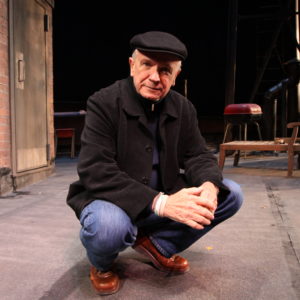Philadelphia, PA (July 1, 2020) – Philadelphia Theatre Company announced moves today that look toward the future of the organization. Producing Artistic Director Paige Price announced that renowned director/choreographer Jeffrey L. Page is joining the PTC artistic team as a Resident Artist, beginning in September. She also announced that the company is reviving the Terrence McNally New Play Award, which was initially launched in 2012, but has not been awarded since 2015. In the first year of its return, the award is open solely to playwrights born, bred or currently residing in Philadelphia.
Read More…
Jeffrey Page is an opera and theatre director of both classical and contemporary works. As director and choreographer, he spearheaded the Tokyo production of the musical Memphis, which received four Yomiuri Award nominations, including Best Musical. The first African American to be named the Marcus Institute Fellow for Opera Directing at The Juilliard School, he has also been nominated for an Emmy Award. Page won an MTV Video Music Award for his work with Beyoncé, whose creative team has included him for more than 12 years. His work was featured on Beyoncé’s “The Formation World Tour,” in her historic Coachella Valley Music and Arts Festival performance, and in two of her HBO specials. Page was the associate creative director for Mariah Carey’s “Sweet, Sweet Fantasy” European Tour, and has been a featured choreographer on Fox Television’s “So You Think You Can Dance.” Page was in the original, award-winning Broadway cast of Fela! And he worked alongside Tony Award-winning composer Jeanine Tesori to choreograph the hit Broadway musical Violet starring Sutton Foster. At the Barrington Theatre Company, Page received glowing reviews as the choreographer for Company, winning a 2016 Berkshire Theater Award for Joe Iconis’ Broadway Bounty Hunter. In 2016, he established Movin’ Legacy as an Indianapolis-based nonprofit organization dedicated to the ethnology and documentation of contemporary and traditional dance from Africa and the African diaspora. He holds a Master’s of Fine Arts degree, with a concentration in Theatre Directing from Columbia University in New York City, and has been awarded the Chuck Davis Emerging Choreographer Fellowship from the Brooklyn Academy of Music. Currently, as choreographer, he is working with Diane Paulus and the American Repertory Theatre at Harvard University to mount the upcoming Broadway production of 1776.
As part of the PTC Artistic team, Page will have opportunities to direct and choreograph. He will play an important role in season planning, help curate the annual season preview event See & Be Scene, and will have oversight over the newly revived Terrence McNally New Play Award.
Philadelphia, PA (July 1, 2020) – Philadelphia Theatre Company announced moves that look to the future. Producing Artistic Director Paige Price announced that renowned director/choreographer Jeffrey L. Page is joining the PTC artistic team as a Resident Artist, beginning in September. She also announced that the company is reviving the Terrence McNally New Play Award, which was initially launched in 2012, but has not been awarded since 2015. In the first year of its return, the award is open solely to playwrights born, bred or currently residing in Philadelphia.
The Terrence McNally New Play Award was first conceived to annually recognize a new play that celebrates themes in McNally’s work. McNally and his husband Kirdahy had approval of the selected recipient (from PTC’s short list). Kirdahy has expressed his desire to participate in the selection process moving forward, as well. Previously, PTC held the world-premiere rights to the winning plays for up to three years following the presentation of the award. The award included a $10,000 cash prize and a year of development at PTC (including readings as well as administrative support (dramaturgical) and access to professional connections to help manage the future of the play beyond its time at PTC).
Prior to McNally’s passing, the theatre was in discussions with the late playwright and his husband, producer Tom Kirdahy, to revive the award. Next season marks the 25th anniversary of Master Class, a McNally masterpiece that premiered at PTC and starred a young Audra McDonald as well as Zoe Caldwell, and went on to win Tony Awards for the play and the actors on Broadway. Philadelphia Theatre Company wishes to both honor McNally, who had a long standing relationship with PTC, and also to put a stake in the ground, committing to the creation of more opportunities and support for artists.
“We always hoped that after this season at Philadelphia Theatre Company, we’d refocus on new play development,” said Price. “In light of the pandemic, we feel that we should ‘seed the ground’ now by developing new work, and also find ways to directly support artists with commissions, online gigs, and this award. We also know that our audiences love thought-provoking plays. By bringing them along on the winning writer’s journey, they can learn more about the work and the process than they ever have before, to tide them over until they are able to come see a live production again.”
Many McNally plays have grappled with queer identity, social justice, and the transformative power of art. These themes will be in the foreground and will be included in how the plays will be evaluated. The play selection procedure will be developed by Price and incoming Resident Artist Jeffrey Page, and will be announced before the application opens up in the fall of 2020. This year, the award is solely open to writers born, raised, or currently residing in Philadelphia.
PTC’s relationship with Terrence McNally includes the World Premieres of Master Class, Golden Age, Some Men and Unusual Acts of Devotion, and the Philadelphia regional premieres of Frankie and Johnny in the Clair de Lune; Lips Together, Teeth Apart; Love!Valour!Compassion!, and Mothers and Sons.
Past Award Recipients
2012: Bill Cain for Unvarnished (now called American Canvas) American Canvas delves into the complex life of Philadelphia artist Thomas Eakins, through his years at Pennsylvania Academy of Fine Arts, his difficult marital relationship, as well as his controversial works of art.
2013: A. Zell Williams for The Urban Retreat The Urban Retreat is about a teacher whose writing career has taken a detour at the request of a former student-turned-Hip-Hop superstar.
2014: Martin Zimmerman for Let Me Count the Ways Inspired by the true story of the first modern pornographic publication, Let Me Count the Ways follows a battle between the libertine poet Pietro Aretino and the pious bishop Gian Matteo Giberti over the mind, loins, and soul of Clement VII, the first post-Reformation pope. Also caught in the struggle between Aretino and Giberti is the fate of 16 sexually explicit prints (entitled ‘The Ways’) that will forever transform the history of print media.
2015: James Ijames for White, which tells the story of Gus, who wants to be a famous visual artist, and Vanessa, who wants to be a working actor. When these two cross paths, their assumptions about art and being an artist are dismantled. In this modern Frankenstein story, Gus’ desire to be acquired by a major contemporary art museum inspires him to hire a woman to claim his work to meet the museum’s demand for “new perspectives.” This play spins out of control as it explores issues of race, gender, sexuality and art.
2015+: added the (first) Special Citation for Continuing Development: Jacqueline Goldfinger for her work-in-progress Fresh (now called Click), in recognition of innovative storytelling. The Citation brought with it a $1,000 stipend to support the future development of the play. A techno-thriller that begins when a young woman is raped at a fraternity and ends in a future where corporations promise a new body with the swipe of a screen, Click follows a hacktivist named Fresh who turns industrial espionage into high art. As this virtual Banksy takes over the global imagination, the man who stole her life develops a technology that sends the two of them on a collision course at the heart of the corporate empire, where innovation comes at any cost.


